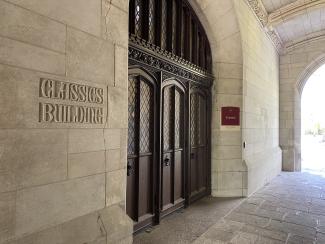
Classics has historically referred to the study of the languages, literatures, history, and material culture of the ancient Greeks and Romans, with the view that ancient artistic, mythological, and intellectual traditions and practices provide foundations from which many societies process and make sense of their own lived experiences.
While the study of Greek and Roman antiquity remains relevant, classicists now regularly seek to engage with broader, interdisciplinary conversations, and the field has expanded to include the study of other peoples of the ancient Mediterranean world (and beyond), such as the Egyptians and Phoenicians, and the reception of classical culture from medieval to contemporary times. Our department reflects these sensibilities and the deeply interdisciplinary opportunities afforded by the intellectual community at the University of Chicago, as we develop innovative approaches to the study of Greek and Roman antiquity through collaborative work with scholars in a wide variety of fields.
In addition to two PhD tracks, Classical Languages and Literatures and the Ancient Mediterranean World, the Department offers joint PhD programs in Classics and Social Thought as well as Classics and Theater and Performance Studies (TAPS). Other joint degrees can be tailored ad hoc, such as one joining Classics and Middle Eastern Studies. More information about these programs can be found in the program descriptions.
We also sponsor three ongoing graduate workshops in Ancient Greek and Roman Philosophy, Ancient Societies, and Rhetoric and Poetics. In recent years, our graduate students have gone on to tenure-track positions at the University of Virginia, University of Utah, St. John’s at Annapolis, University of Illinois Urbana-Champaign, Southern Adventist University, and Columbia University, while others have pursued careers outside the academy.
Our department offers three different tracks for Classics majors, ranging from a language intensive track to one in with greater emphasis on the history and culture of the ancient Greek and Roman world (and beyond). We also offer Study Abroad programs in Athens and Rome, and a number of prizes for undergraduate students who wish pursue their interests beyond regular coursework.
Undergraduate students interested in Classics maintain a close community through regular social events organized by the Classics Society and through extensive collaboration on Animus, a Classics-focused undergraduate journal. Some recent graduates have continued to study Classics at the graduate level or gone onto law school or medical school, while others now work in national politics, finance, or tech, and at a range of not-for-profit organizations.
The Classics Department is also home to Classical Philology, an internationally respected journal for the study of the life, languages, and thought of the ancient Greek and Roman world since 1906. Classical Philology offers opportunities to both undergraduate and graduate students to serve as assistant editors and learn about the world of academic publishing. For more information, including access to recent issues, please visit the journal’s homepage.
